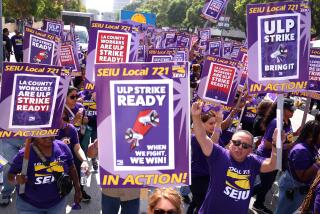Police, City to Use Mediator in Negotiations : Labor: Friday is set as target for accord. Union agrees to suspend job actions and not to gather information on council members.
In what is considered a major breakthrough in the stalled labor negotiations between Los Angeles police and the city, both sides agreed Monday to bring a mediator into the talks and to set Friday as the target date for reaching a contract agreement.
Union officials said the agreement Monday would mean a suspension of any job actions by police officers, such as the “blue flu” sickout last week that disrupted staffing throughout the city and that officers threatened to repeat during the upcoming World Cup soccer matches.
Also to be eliminated, the union said, is the “information gathering” on City Council members that was threatened late last week by union officials. City Council members likened the threat to blackmail and a number of civil rights organizations joined forces Monday to denounce it.
The compromise, reached shortly before 5 p.m. Monday, came as the city said it was about to declare an impasse in the talks. The police union reversed its position and agreed to the mediator late in the day, only a few minutes before Mayor Richard Riordan was to read a statement declaring the talks deadlocked.
As a concession to the union, the mediator will be called a “neutral third party settlement adviser.”
The union’s acceptance of a mediator was seen as an important step in the stalled talks, coming just days after union leaders rejected a similar offer. The union had said previously that it would agree only to binding arbitration, not a mediator or settlement judge who would not have the legal power to resolve the matter.
Danny Staggs, president of the Police Protective League, said in a prepared statement that an impasse would have been counterproductive for both sides.
“We have agreed that both parties will be committed to the outcome,” he said. “I believe negotiating is a form of give and take. I believe the City Council and the mayor took a step forward by saying they would be committed to it.”
Monday had its share of drama, as the negotiations reached critical points at which they could have broken down. The city was prepared to declare an impasse at 10 a.m. That decision was then put off until 2 p.m. Finally, at 4:55 p.m., five minutes before the city was to announce the deadlock, the union agreed to accept a mediator.
In the course of Monday’s negotiations, the union demanded that the city meet 11 conditions before a mediator was accepted. These ranged from amnesty for those who participated in the sickout to confidentiality for all future negotiations.
But the city would agree to only two of the demands--that the talks be held at a neutral site and that they remain confidential. The city also insisted that the union denounce any protests by officers that target City Council members.
The mediator will be chosen jointly. Staggs said he expected that an agreement on a new contract could be reached by the Friday target date, presuming both sides quickly agree on the settlement adviser.
“We’re looking for people who have experience in that field,” he said.
Earlier in the day, a coalition of civil rights groups, led by the Southern Christian Leadership Conference, directed highly critical remarks toward the police union negotiators, characterizing their threat to dig up dirt on City Council members as “strong-arm tactics.”
In reply, union spokesman Geoffrey Garfield said the threat to release embarrassing information about council members was nothing more than “opposition research” designed to push forward the negotiations that have been stalled for two years.
The group of seven civil rights representatives said they were troubled by the threats, which included the suggestion that the police might picket council members’ homes and purchase billboard space to draw attention to the protracted negotiations.
The concern about the gathering of embarrassing information on council members was reflected in Riordan’s prepared statement of impasse--one he did not issue--in which he referred to “unprecedented threats made by league board members against the mayor and individual members of the city council and their personal privacy.”
More to Read
Sign up for Essential California
The most important California stories and recommendations in your inbox every morning.
You may occasionally receive promotional content from the Los Angeles Times.










